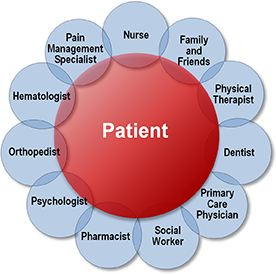Hemophilia Treatment Centers (HTCs)

Bleeding disorders are very complex. Good quality medical care from doctors, nurses, and other health care providers who are experts in the particular bleeding disorder that your child has can help prevent serious problems. Often the best choice is a hemophilia treatment center (HTC) because they provide comprehensive care, which is a coordinated, multidisciplinary approach to managing hemophilia and other bleeding disorders.
What Are HTCs?
HTCs provide comprehensive care that address all issues related to the bleeding disorder, as well as education about the disorder. The team consists of physicians (hematologists), nurses, social workers, physical therapists, and other health care providers who specialize in the care of people with bleeding disorders.
What Is Comprehensive Care?
Comprehensive care is a hemophilia health care system that uses an experienced team to provide the best possible care for a person with a bleeding disorder and his or her family. The team consists of professionals from several disciplines who partner with patients and families to design an individualized care plan that coordinates the complex medical services required to manage the disorder.
This multidisciplinary team of medical professionals conducts in-depth annual evaluations, as well as meets with the person with the bleeding disorder and his or her family routinely.
In addition, comprehensive care HTCs provide services to meet all of the needs—physical, psychosocial, and educational—common to patients with bleeding disorders. Care is provided regardless of race, religion, culture, or ability to pay.
The reach of comprehensive care expands into the community. Comprehensive care teams work with schools, health insurance companies, and employers to help affected children stay in school, maintain patient access to care, and gain and maintain employment.
Another key service of an HTC is participation in the Universal Data Collection (UDC) system. UDC is a nationwide project of the Centers for Disease Control and Prevention’s Division of Blood Disorders. The system was designed to routinely collect health information that is necessary to monitor major complications of bleeding disorders. Persons with bleeding disorders are eligible to enroll in UDC at their participating HTC.
For more information, go to UDC.
What Is the Track Record of Comprehensive Care?
Since first established in 1975, HTCs have provided excellence in care. The comprehensive care model has a proven record of improving health and reducing costs by lowering rates of unemployment, emergency department visits, hospital stays, and illness-related time off from work and school. A Centers for Disease Control and Prevention (CDC) study found that the rate of hospital stays for bleeding-related events among patients seen in HTCs was 40% lower than the rates for patients seen in other care facilities. Patients seen in HTCs are 40% less likely than those seen elsewhere to die of a hemophilia-related complication.
The team includes doctors, nurses, social workers, psychologists, physical therapists, orthopedists, genetic counselors, dentists, and other specialists who are experts in caring for patients with bleeding disorders.

Remember, the patient is the most important member of the comprehensive care team.
What Happens at a Comprehensive Care HTC Visit?
Every HTC performs similar comprehensive care evaluations. These visits provide an opportunity to hear your concerns, clarify challenges, and, with your input, develop a comprehensive, individualized plan to follow throughout the year. The visit lasts several hours because the person with the bleeding disorder and his or her caregiver will see all members of the team.
Here are some examples of what may take place at a comprehensive care HTC visit:
- The team gets a careful history of bleeding, treatment, and other medical issues
- The team answers questions and develops a plan with the family for treatment and education
- Blood is drawn; laboratory studies are done and interpreted
- Physical exams, other tests, and imaging studies are performed, if needed
- The physical therapist will assess muscle strength and function of joints
- The social worker (or psychologist) will meet with the family to help identify problems and help find solutions
- New trends in treatment options are discussed
- Current research will be discussed and appropriate participation will be offered
- Written letters and reports will be prepared and provided following the clinic visit
- You will participate in choosing a clotting factor replacement product and home delivery service
- There are opportunities to speak with other people going through the same experience
Visiting the HTC
Talking to a doctor or any health care provider can be hard. Sometimes we are scared to ask questions or worry we might be complaining too much, but when it comes to our family’s health, we must speak up.
We must take charge of our family’s health and become partners with our health care team. The following tips will help you get the most out of your child’s visit with the hemophilia health care team.
Prepare for Your Visit
Before you talk to the doctor and other hemophilia health care team members, take time to:
- Write down the symptoms in detail. When did they start? What makes them better? What makes them worse?
- Keep a health diary. For a month or two, write down:
- When the symptoms begin
- What lead to the symptoms
- Make note of the energy level. When was it high? When was it low?
- What activities were involved? Were any missed as a result?
- How about school or work?
- Make a list of family members
- Who has similar bleeding symptoms? What is their relationship to your child?
- Who has been diagnosed with a bleeding disorder (such as hemophilia or von Willebrand disease)? How are they related to your child?
When You Go for the Visit, Bring:
- A description of the symptoms
- The health diary infusion log
- A list of family members with similar symptoms and diagnosed bleeding disorders
- Names of prescription and nonprescription medications. Include vitamins, herbal remedies, and pain medicines
- Names of medications and foods to which there is an allergic reaction
- Medical records, including X-ray films, test results, or past doctor’s records
- Take a notepad to jot down information. Talk to your health care provider about tape recording important information about the bleeding disorder and its care. Some patients and caregivers have found it helps to bring a trusted family member or friend to appointments. That person will help you remember what was said and may ask questions you didn’t think to ask
At Your Visit
- The hemophilia health care team will need all the important details. Don’t wait to be asked
- Revealing personal information is nothing to be ashamed of; the health care team is used to hearing deeply personal information
- Asking questions is essential. Otherwise, health care providers will think all their information is clear
- Taking notes or asking your health care team if you can record their instructions
- Ask them to draw a picture if you think that will help you better understand
- Ask for written instructions for any treatment prescribed. HTCs often have brochures, audio tapes, or videotapes to help add clarity
- Alert the health care team if there’s something that might interfere with filling or taking a prescribed treatment (for example, Is cost a problem? Is it hard to swallow pills? Do injections frighten the patient?)
- Ask them how to learn more about specific concerns like diagnosis and treatment of the bleeding disorder
After Your Visit
When arriving at home, read over the notes from the talk with the doctor. If you recorded your talk, listen to the conversation. Review treatment instructions and any other written materials provided by your doctor.
- If there are further questions or concerns, call the HTC and ask them to put you in touch with a doctor, physician’s assistant, nurse practitioner, or another member of the health care team who can answer those questions
- If the doctor wants some tests performed, make an appointment with the lab (sometimes someone in the doctor’s office will make these appointments)
- If the tests have been done but the doctor doesn’t get back to you with the results, call the doctor
- If the doctor recommends seeing a specialist, make an appointment with that specialist
Understanding the Treatment Plan and Preparedness
Your role as a parent is to take an active role in partnering with health care providers to develop, evaluate, and maintain your child’s treatment plan. The aim is to reduce or prevent bleeding episodes and related complications.
The HTC team will conduct a comprehensive evaluation and design an individualized care plan that you should follow and can share with any local health care provider.
In addition to the treatment plan, here are some other points that will help you in the event of an emergency:
- Your HTC will provide you with a letter that outlines your child’s type of bleeding disorder, severity, treatment plan, and contact numbers to call for consultation or emergency care
- Even if your child is not on home therapy, you should keep 2 to 3 doses of clotting factor or medications needed to stop bleeding at home and take it with you to the hospital if emergency care is needed
- If your family is traveling or relocating, find local HTCs and bleeding disorder specialists through the National Hemophilia Foundation or the Centers for Disease Control and Prevention
- Check out the HTC locator above.
Your HTC: More Than Just a Treatment Center
- The HTC often serves as the central source of medical care and information for individuals with a bleeding disorder and their families. The HTC can provide more than treatment; they can be partners in care over the course of a lifetime.
- Having a strong tie with your health care team can benefit you and your entire family. In this video, you will hear from people who have formed meaningful relationships with their HTC.
